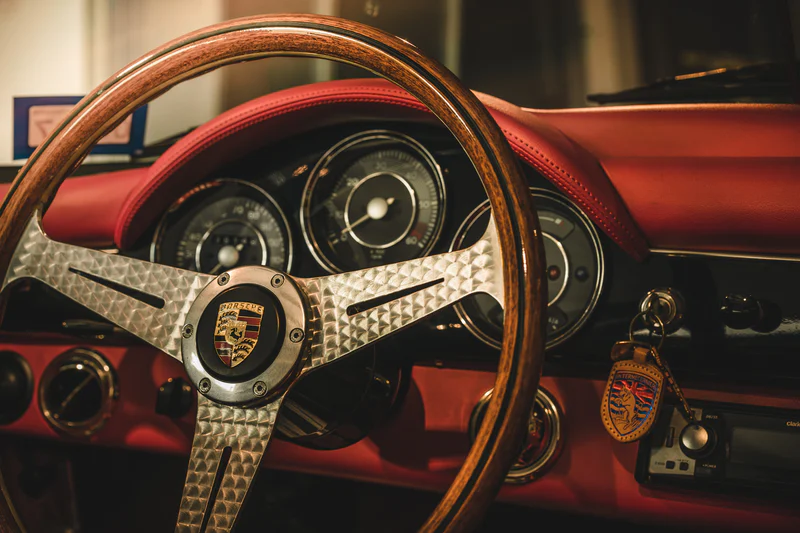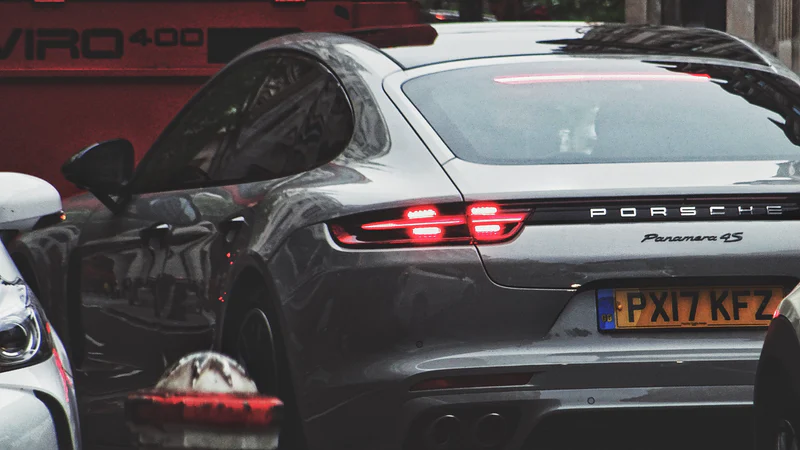Departure. Editor’s note: This article is from ”
Future car Daily “(micro-channel public number ID: auto-time), Author: Ding unique.
Image source: Unsplash
Author丨Ding Youwei
Edit丨Wang Yan
When the direction of the tide changed, the traditional giants who turned the bow began to change.
Recently, Reuters quoted sources as saying that Volkswagen Group is considering independent listing of its sports car brand Porsche to boost the company’s market value. The funds raised from the listing may be used for acquisitions and technology investments. The German “Manager” magazine once quoted sources as saying that Volkswagen may list 25% of Porsche’s shares, with a valuation of 20 to 25 billion euros.
Nowadays, how traditional giants can ensure a smooth transformation and obtain a higher valuation in the capital market has become a new test.
In November 2020, Herbert Diess, the head of the Volkswagen Group, said frankly, “The size, history, current value of the brand and the unique expertise in the classic car manufacturing field The period of upheaval may become a burden.”
Behind this is another pattern of subversion of the global automotive industry. In 2020, Tesla surpassed Toyota to become the world’s largest car company by market value. Domestic new cars are also rising. Weilai Automobile once surpassed the century-old car manufacturer Daimler.
While focusing on transformation, the public had to initiate a series of “disappearances”. Regarding Porsche’s listing time, Bloomberg pointed out that it is likely to be listed in 2022. Citing an anonymous source, Volkswagen plans to retain a majority stake in the initial public offering.
In fact, another brand of Volkswagen Group is also facing a similar situation. On February 22, Reuters reported that the Volkswagen Group will decide on Bugatti’s fate in the first half of this year, and it is very likely that Bugatti will eventually be sold to the Croatian car manufacturer Rimac.
However, compared to Bugatti’s successive years of losses, Porsche has played a “profit cow” in the Volkswagen Group. Why is it now also facing the fate of being “dumped”?
“Abandoned Son” Porsche
Among the many brands of the Volkswagen Group, if you consider seniority, Volkswagen, which sells millions of vehicles a year, is a well-deserved “sales responsibility.”However, compared with the small profits but quick turnover of other brands, the “profit cow” Porsche is regarded internally as the crown jewel of the Volkswagen Group.
According to the 2019 Volkswagen Group’s financial report, the average bicycle profit of the Volkswagen Group was 12,100 yuan that year, while Porsche’s reached 101,200 yuan, far exceeding the average. With its high bicycle profits, Porsche has also become a small money maker for the Volkswagen Group. In 2019, Porsche once again became the sales return champion in the Volkswagen Group with a return rate of 16.2%.
As soon as the news of this independence came out, the capital market with a sharper sense of smell was the first to be excited. Volkswagen’s preferred stock rose 5.7%, of which Porsche Holdings, which holds 53.3% of Volkswagen’s common stock, rose 6%, Volkswagen rose more than 3% on the Frankfurt exchange, and US stocks rose 2.8% after the opening.
However, in the opinion of former Volkswagen Group employee Xu Bo, as a sub-brand of the Volkswagen Group, Porsche has its own style. “Although some models will use Audi’s platform, they will remain independent in terms of model development and marketing.”
He analyzed to Future Auto Daily (ID: auto-time), “The Volkswagen Group will not control Porsche’s model iteration plan, nor will it interfere with Porsche’s sales expectations, and it can use Volkswagen’s resources so that it can Ensure that Porsche’s profits are maximized.”
Source: Unsplash
The idea of ”flying solo” is not the first time. In 2018, Porsche Chief Financial Officer Lutz Meschke (Lutz Meschke) revealed his willingness to go public in an informal press conference. He said that the hidden value of the company’s separate listing may exceed Ferrari (at the time it was valued at 22 billion US dollars). However, the listing plan finally ended with the official denial of the Volkswagen Group.
This time the Volkswagen Group started to let go, to some extent, it was also a choice it had to make. The auto industry, swept by the new four modernizations, is experiencing unprecedented impact and reshuffle. Even the giants can’t stand alone.
Nowadays, the major premise of the industry has undergone tremendous changes. The Volkswagen Group has chosen All in electrification, and Porsche has also begun to attack electrification.
In December 2020, Volkswagen stated that it plans to invest 73 billion euros in five years for the development of pure electric vehicles, hybrid vehicles and digitalizationTechnology, including 35 billion euros for the research and development of pure electric vehicles, accounting for about half of the total investment. On the other hand, Porsche plans to invest 15 billion euros in electrification and digital transformation, and provide 80% of pure electric or hybrid vehicles by 2030.
The huge amount of funds required behind the transformation and the ever-changing market competition, “unbreakable and unreliable” seems to be the current situation between Volkswagen and Porsche.
However, once Porsche is listed independently, it also means that the Volkswagen Group can no longer enjoy the profit dividends brought by Porsche. Whether this independent listing can finally take place depends on the trade-offs and games of both parties.
Lost the “baggage”
For the Volkswagen Group, which owns several ultra-luxury brands, once the brand and appearance responsible persons fail to realize their value and walk at the key node of the transformation, they will be the first to be “abandoned”.
As early as 2015, after the “emission gate” incident, Volkswagen tried to streamline and slim down. Faced with the huge fines caused by the “emission gate” scandal, Matthias Mueller, the CEO of Volkswagen Group at the time, said that he would postpone or cancel all non-essential investment projects to reduce expenses.
At the time, many analysts also believed that if the impact of the “emission gate” deteriorates, Volkswagen will have to “surge” some of its non-profit brands.
Source: Unsplash
This prediction was fulfilled after the new head, Diss, took over in 2018. In a speech in 2018, Diss said: “It is conceivable to divest (part of the brand), and so is the expansion (brand and business).”
In the following years, Volkswagen Group’s brands-Bentley, Lamborghini, Bugatti and Italian motorcycle brand Ducati were frequently involved in rumors of being “abandoned by the public”.
In 2020, Volkswagen, whose burden is increasing during the transition period, will officially swing its knife to sub-brands whose sales are sluggish and have been losing money for years. In October 2020, Diss officially announced that from 2021, Bentley will become a sub-brand of Audi and will no longer directly belong to the Volkswagen Group. In the future, it will also use more Audi technology and platforms.
The Volkswagen Group’s financial report shows that from 2009 to 2018, Bentley’s performance in 2011-2017It has been profitable for 7 consecutive years, with a total profit of 723 million euros, but this figure cannot even make up for the loss of 727 million euros in the previous three years.
Almost at the same time, Volkswagen announced plans to package Lamborghini, Ducati and design company (ItalDesign Giugiaro) for sale. Although Diss said that no decision has been made yet, it is only in the discussion stage, but he also admitted that he “has been on the agenda.”
On the one hand, bidding farewell to loss-making luxury brands will undoubtedly make the public’s “turn around” lighter. Frank Witter, the chief financial officer of Volkswagen, once stated that he hopes to increase the profitability of the group by “slimming” while taking into account the EU’s latest emission reduction tasks. “From the overall structure of the group, reducing complexity is valuable.”
On the other hand, the Volkswagen Group also hopes to increase its valuation in the capital market by means of a spin-off and listing, so as to achieve the plan set by Diss to double its market value to 200 billion euros in 2019.
The positive case of profiting through the spin-off and listing can be confirmed by Ferrari. In 2015, Ferrari was spin-off from Fiat Chrysler Automobiles (FCA), and its current market value is 35 billion U.S. dollars. You know, in 2019, Ferrari sold only 10,000 cars worldwide, with a profit of 699 million euros; while Porsche’s global sales of 280,000 vehicles in the same year also reached a profit of 4.4 billion euros.
Nowadays, Porsche seems to have such potential. Bloomberg Intelligence analyst Michael Dean said in a report that Porsche plans to achieve full electric power in almost all models except 911 by 2030. This means that in the future, Porsche can “attract multinational (electric car) companies like Tesla, and can (rely on 911 models) generate profit margins equivalent to Ferrari”. Dean analyzed that Porsche’s market value may be as high as 110 billion euros, far exceeding its parent company.
(At the request of the interviewee, the characters in the text are pseudonyms)
Please pay attention to Future Car Daily



